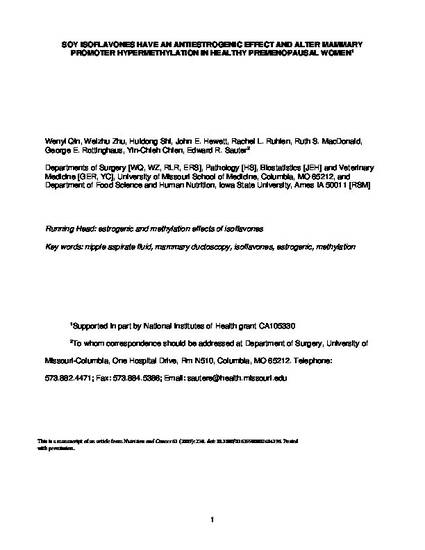
We hypothesized that soy isoflavones would have dose related estrogenic and methylation effects. 34 healthy premenopausal women were prospectively enrolled and randomized in double-blind fashion to receive either 40 mg or 140 mg isoflavones daily through one menstrual cycle. Breast specific (NAF) and systemic (serum) estrogenic effects were assessed measuring the estrogenic marker complement (C)3 and changes in cytology, while methylation effects were evaluated in mammary ductoscopy (MD) specimens using methylation specific PCR assessment of five genes (p16, RASSF1A, RARβ2, ER, and CCND2) associated with breast carcinogenesis. Serum genistein significantly increased post treatment in women consuming both isoflavone doses. Neither NAF nor MD cytology significantly changed after either low or high dose isoflavones. Serum C3 levels post treatment were inversely related to change in serum genistein (r= -0.76, p=0.0045) in women consuming low dose isoflavones. RARβ2 hypermethylation increased post treatment correlated with the post treatment level of genistein among all subjects (r=0.67, p=0.0017) and in women receiving high dose isoflavones (r=0.68, p=0.021). At the low dose, CCND2 hypermethylation increase correlated with post treatment genistein levels (r=0.79, p=0.011). The inverse correlation between C3 and genistein suggests an antiestrogenic effect. Isoflavones induced dose specific changes in RARβ2 and CCND2 gene methylation which correlated with genistein levels. This work provides novel insights into estrogenic and methylation effects of dietary isoflavones. 2
Available at: http://works.bepress.com/ruth_macdonald/6/

This is a manuscript of an article from Nutrition and Cancer. 61(2): 2009, 238-244. doi: 10.1080/01635580802404196. Posted with permission.